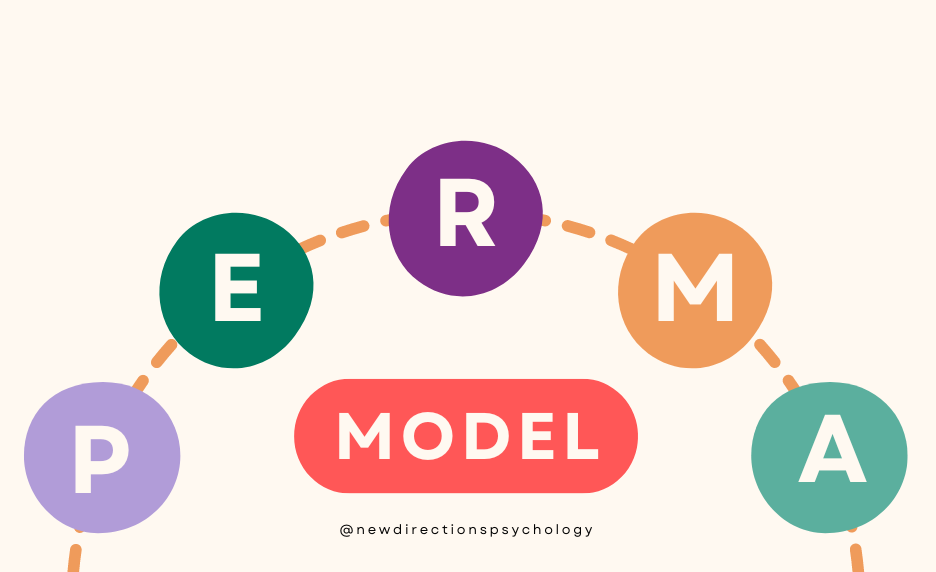Happiness and wellbeing can seem fleeting. We strive for them, yet they are often realised only in hindsight. Though most agree well-being is essential, our culture and competing priorities don’t always align with experiencing it.
Martin Seligman, a pioneer in positive psychology, put forth the PERMA model outlining five building blocks of human flourishing. PERMA provides a framework beyond just feeling happy, underpinning a philosophy of Positive Education.
PERMA represents five important elements of well-being and happiness:
Positive Emotions – Feeling good
Engagement – Absorption in activities
Relationships – Authentic connections
Meaning – Purposeful existence
Accomplishments – Success and achievement
Positive Emotions 
Positive emotions like joy, pride, contentment, awe, amusement, and gratitude are key indicators of flourishing. Studies show that purposefully cultivating positive emotions builds resilience and undoes the harmful effects of negative emotions and adversity (Fredrickson, 2001).
Increasing daily positive emotions helps individuals build lasting physical, intellectual, psychological and social resources that lead to this resilience and long-term well-being. Positive emotions expand our thinking and behavioural repertoires, improving habitual thoughts and actions.
There are many simple yet impactful ways to cultivate positive emotions on a daily basis:
- Make time to spend with people you care deeply about. Research shows that shared experiences of positive emotions with loved ones builds stronger connections and satisfaction (Kok et al., 2013).
- Engage in hobbies, creative activities and pursuits that you enjoy. Things like art, music, writing, dance, and crafts that get your creative juices flowing regularly, induce positive emotions.
- Listen to uplifting, inspirational music. Studies reveal music strongly influences emotions and moods – inspiring songs literally lift our spirits (Juslin & Sakka, 2019).
- Take time to reflect on all the things you feel grateful for in both your life circumstances and inherent qualities. Conscious gratitude practices markedly increased positive emotions and life satisfaction
Engagement
The concept of engagement closely aligns with psychologist Mihaly Csikszentmihalyi’s seminal notion of “flow” – complete absorption in an activity where you lose self-consciousness and live fully in the present moment. This immersion happens most often when challenges perfectly match our skills and strengths (Csikszentmihalyi & LeFevre, 1989).
People are more likely to enter flow when they flex their unique character strengths in novel ways. A flow state of mind spontaneously arises when we become immersed in an activity so completely that we lose track of time. By doing so, minimises distraction, maximises productivity and performance, and eliminates procrastination.
While engagement promotes happiness, its benefits run much deeper than simply ‘feeling good’. Engagement represents a state of complete focus and single-minded immersion, leading to a sense of mastery and fulfilment.
There are simple ways to increase this type of engaged living:
- Make time for activities you are deeply passionate about, especially ones where you regularly lose track of time while engrossed in the process.
- Practice mindfulness techniques to fully live in the present moment. Even mundane tasks like washing dishes or driving can become engaging when attention is focused solely on the sensory experience.
- Spend time immersed in nature, intently observing what unfolds around you. Research shows even passive absorption in natural settings elicits recovery, restoration and feelings of vitality (Petersen et al., 2021).
- Identify your innate character strengths and pursue activities that allow you to flex the ones you excel at. Emphasising strengths fosters growth, mastery and engagement (Lai et al., 2018).
Relationships 
Many people strive for closer bonds with intimate others. Research reveals that sharing good news, celebrating success and responding enthusiastically to those closest to you increases feelings of intimacy, satisfaction, and well-being over time.
Small efforts to nurture relationships cumulatively make a major difference. Consider:
- Joining a class, club or special interest group to expand your social circle and meet like-minded people.
- Making an effort to have real conversations and ask questions to get to know casual acquaintances better.
- Reaching out to friends or family members you’ve lost touch with over the years to reestablish dormant social ties.
- Showing genuine interest in people you interact with, asking questions and actively listening to find common ground.
Meaning
Another intrinsic human motivator is the search for meaning and purpose beyond the self. Seligman (2012) described meaning “as a sense of belonging to and serving something greater than oneself”. Having a sense of meaning and purpose helps people stay focused on what really matters, especially in times of challenge or adversity.
Meaning may be pursued through creative endeavours, social or political activism, spiritual beliefs, or dedication to family or a cherished career path. Ultimately, meaning stems from a feeling of values alignment and serving something greater. Those with purpose live longer, gain life satisfaction, and have better health (Kashdan et al., 2009). There are many avenues to cultivating greater meaning:
- Getting involved in a cause or organisation you feel passionate about. Lifting others gives life meaning.
- Exploring new creative pursuits to uncover what provides that feeling of purposeful resonance.
- Considering how your innate passions and talents can contribute to the betterment of society. For example, volunteering and giving back in our community is the activity that may provide our life meaning.
- Carving out quality time for loved ones who anchor your sense of meaning.
Accomplishment

The final piece of PERMA is accomplishment, also described as personal achievement, mastery or competence. Accomplishment refers to the deeply satisfying feeling of working diligently toward goals and ultimately succeeding. Reaching milestones and honing skills instils pride and enhances well-being (Seligman, 2012).
True accomplishment requires perseverance, passion and grit to progress toward milestones. But optimal accomplishment and flourishing come when pursuits are driven by internal motivations like growth, learning and meaning rather than external achievement for rewards like fame, glory or money (Quinn, 2018).
Ways to foster genuine accomplishment:
- Set specific, measurable goals that align with your values and purpose. Having clearly defined goals with action steps markedly increases the likelihood of achievement (Falecki et al., 2018). It could be as straightforward as compiling a list of tasks to tackle and checking them off as you progress. Resulting in the feeling of achievement that arises upon completing that list.
- Make time to reflect on past successes, milestones and personal growth. This builds confidence to take on higher challenges.
- Look for creative ways to celebrate achievements and progress along the journey. Small rituals reinforce motivation.
The Takeaway
In the pursuit of true flourishing, let PERMA be your steadfast companion. Awareness of PERMA can increase well-being through positive emotions, engagement, relationships, meaning and accomplishments. Use this model to focus on feeling good while living meaningfully, developing supportive relationships, reaching goals, and fully engaging with life. With PERMA as your compass, may you navigate life’s challenges with resilience and flourish in the pursuit of happiness and well-being.











